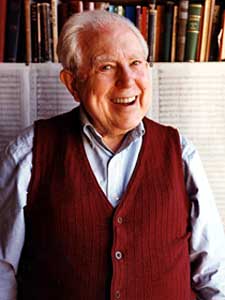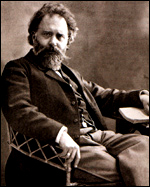Related Research Articles

Elliott Cook Carter Jr. was an American modernist composer. One of the most respected composers of the second half of the 20th century, he combined elements of European modernism and American "ultra-modernism" into a distinctive style with a personal harmonic and rhythmic language, after an early neoclassical phase. His compositions are performed throughout the world, and include orchestral, chamber music, solo instrumental, and vocal works. The recipient of many awards, Carter was twice awarded the Pulitzer Prize.

Ein Heldenleben, Op. 40, is a tone poem by Richard Strauss. The work was completed in 1898. It was his eighth work in the genre, and exceeded any of its predecessors in its orchestral demands. Generally agreed to be autobiographical in nature despite contradictory statements on the matter by the composer, the work contains more than thirty quotations from Strauss's earlier works, including Also sprach Zarathustra, Till Eulenspiegel, Don Quixote, Don Juan, and Death and Transfiguration.

Don Quixote, Op. 35 is a tone poem by Richard Strauss for cello, viola, and orchestra. Subtitled Phantastische Variationen über ein Thema ritterlichen Charakters, the work is based on the novel Don Quixote de la Mancha by Miguel de Cervantes. Strauss composed this work in Munich in 1897. The premiere took place in Cologne on 8 March 1898, with Friedrich Grützmacher as the cello soloist and Franz Wüllner as the conductor.

Don Quixote, Op. 50 is an opera in three acts by Wilhelm Kienzl. The libretto, written by the composer, is based on the novel by Miguel de Cervantes.
The Violin Concerto is a concerto for violin and orchestra in three movements by the American composer Elliott Carter. The work was jointly commissioned by the San Francisco Symphony and the violinist Ole Bøhn. It was completed February 26, 1990 in Waccabuc, New York, and was premiered May 2, 1990 in San Francisco, with conductor Herbert Blomstedt leading Bøhn and the San Francisco Symphony. The piece won the 1994 Grammy Award for Best Classical Contemporary Composition.
The Concerto for Bassoon and Orchestra is a composition for solo bassoon and orchestra in three movements by the American composer Marc Neikrug. The work was jointly commissioned by the National Symphony Orchestra, the Boston Symphony Orchestra, the Milwaukee Symphony Orchestra, and the National Arts Centre Orchestra. It was premiered in Boston November 21, 2013, with the Boston Symphony Orchestra and principal bassoonist Richard Svoboda performing under conductor Rafael Frühbeck de Burgos.
Friandises is a ballet in five movements written by the American composer Christopher Rouse and originally choreographed by Peter Martins. The score was jointly commissioned by the New York City Ballet and the Juilliard School and was completed in September 2005. It was first performed by the New York City Ballet February 10, 2006 at the New York State Theater in Lincoln Center, New York City. The title of the piece loosely translates in the French language to "bits" or "morsels".
Dialogues is a composition for solo piano and chamber orchestra by the American composer Elliott Carter. The work was commissioned by the BBC for the pianist Nicolas Hodges and completed in 2003. It was first performed on January 23, 2004 at the Queen Elizabeth Hall in Southbank Centre, London, by Nicolas Hodges and the London Sinfonietta under the conductor Oliver Knussen. The piece was a finalist for the 2005 Pulitzer Prize for Music. In 2012, Carter composed a followup to the piece Dialogues II for the conductor Daniel Barenboim's 70th birthday.
The Concerto for Horn and Orchestra is a horn concerto by the American composer Elliott Carter. The work was commissioned by the Boston Symphony Orchestra for the horn player James Sommerville. It was first performed on November 15, 2007 in Boston by Sommerville and the Boston Symphony Orchestra under the conductor James Levine.
Soundings is an orchestral composition by the American composer Elliott Carter. The work was commissioned by the Chicago Symphony Orchestra for their final season with the conductor Daniel Barenboim as music director. It was first performed on October 6, 2005 at the Symphony Center, Chicago, by Barenboim and the Chicago Symphony Orchestra.
The Boston Concerto is a concerto for orchestra by the American composer Elliott Carter. The work was commissioned by the Boston Symphony Orchestra, for which the piece is titled. It was first performed in Symphony Hall, Boston, on April 3, 2003 by the Boston Symphony Orchestra under the conductor Ingo Metzmacher. Carter dedicated the concerto to his wife Helen Jones Carter, who died on May 17, 2003.
The Flute Concerto is a composition for solo flute and orchestra by the American composer Elliott Carter. The work was commissioned by Elena Bashkirova for the Jerusalem International Chamber Music. Carter began the composition in September 2007 and completed it in March 2008 at the age of 99. The piece was first performed at the Jerusalem International YMCA on September 9, 2008 by the flutist Emmanuel Pahud and the Jerusalem International Chamber Music Ensemble under the conductor Daniel Barenboim.
The Cello Concerto is a composition for solo cello and orchestra by the American composer Elliott Carter. The work was commissioned by the Chicago Symphony Orchestra for the cellist Yo-Yo Ma. It was first performed in Chicago, Illinois, on September 27, 2001 by Yo-Yo Ma and the Chicago Symphony Orchestra under the conductor Daniel Barenboim.
The Symphonia: sum fluxae pretium spei is an orchestral triptych by the American composer Elliott Carter. Its three movements were composed between 1993 and 1995. The complete work was first performed on April 25, 1998 at Bridgewater Hall, Manchester by the BBC Symphony Orchestra under the conductor Oliver Knussen. The second movement "Adagio tenebroso" was a finalist for the 1996 Pulitzer Prize for Music.
Three Occasions for Orchestra is an orchestral triptych by the American composer Elliott Carter. The work was composed from 1986 through 1989 and was first performed at the Royal Festival Hall, London, by the BBC Symphony Orchestra under Oliver Knussen on October 5, 1989.
Interventions is a composition for solo piano and orchestra by the American composer Elliott Carter. The work was composed at the behest of the pianist Daniel Barenboim and the conductor James Levine to celebrate Carter's 100th birthday. The piece was completed on April 16, 2007 and was first performed in Symphony Hall, Boston on December 4, 2008 by Daniel Barenboim and the Boston Symphony Orchestra under James Levine.
The Symphony No. 6 is a composition for mezzo-soprano solo and orchestra by the American composer John Harbison. The work was commissioned by the Boston Symphony Orchestra under the conductor James Levine. It was composed in 2011 and was given its world premiere in Boston on January 12, 2012 by the mezzo-soprano Paula Murrihy and the Boston Symphony Orchestra under the direction of David Zinman. The piece is dedicated "in friendship and gratitude" to James Levine, who would have conducted the premiere had he not retired from his post as the music director of the Boston Symphony Orchestra due to health concerns.
The Symphony No. 5 is a composition for baritone, mezzo-soprano, and orchestra by the American composer John Harbison. The work was commissioned by the Boston Symphony Orchestra under the conductor James Levine. It was given its world premiere in Boston on April 17, 2008 by the mezzo-soprano Kate Lindsey, the baritone Nathan Gunn, and the Boston Symphony Orchestra directed by James Levine. The text of the piece is set to Orpheus and Eurydice by Czesław Miłosz, Relic by Louise Glück, and the Sonnets to Orpheus by Rainer Maria Rilke.
The Symphony No. 2 is an orchestral composition by the American composer John Harbison. The work was commissioned by the San Francisco Symphony for its 75th anniversary. It was composed in 1987.
Karawane is a composition for chorus and orchestra by the Finnish composer Esa-Pekka Salonen. The work was jointly commissioned by the Tonhalle Orchester Zürich, the Swedish Radio Symphony Orchestra, the New York Philharmonic with support from the philanthropist Marie-Josée Kravis, the Bamberg Symphony, and the Finnish Radio Symphony Orchestra. It was first performed by the Tonhalle Orchester Zürich and the Zürcher Sing-Akademie conducted by Lionel Bringuier in the Tonhalle, Zürich, on September 10, 2014. The piece is set to the eponymous poem by the German author and Dadaist Hugo Ball.
References
- 1 2 3 4 5 Carter, Elliott (2004). "Three Illusions for Orchestra". Boosey & Hawkes . Retrieved February 20, 2016.
- ↑ Grella, George (February 9, 2015). "Levine, MET Orchestra bring weight and precision to Carter and Beethoven". New York Classical Review. Retrieved February 20, 2016.
- ↑ Midgette, Anne (May 15, 2007). "The Familiar and the New, With Gusto". The New York Times . Retrieved February 20, 2016.
- ↑ Clements, Andrew (10 September 2007). "Prom 71". The Guardian . Retrieved February 20, 2016.